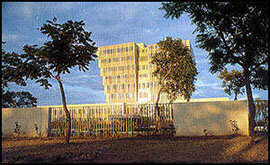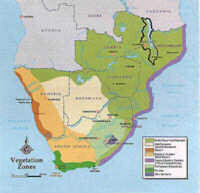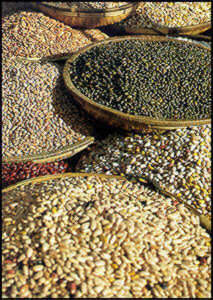 BUSINESS ENVIRONMENT & FOREIGN TRADE BUSINESS ENVIRONMENT & FOREIGN TRADE |
 BUSINESS AND INVESTMENT BUSINESS AND INVESTMENT |

Malawi has undergone a social and political transformation in recent years which has created a new optimism within the country. It is now poised to capitalize on its comparative advantage through greater cooperation with private sector investors. Foreign investment is welcome and inward transfers of capital are not restricted. The Government plans to liberalize capital flows further and the few remaining restrictions on payment for current account international transactions were lifted in February 1995. There are no restrictions on the transfer of dividends, license fees and profits by foreign owned companies. To promote domestic and foreign investment in export-oriented manufacturing, the Malawi Government has liberalized regulations over the past 10 years. The Investment Promotion Act of 1981 cut out the need for general investment licenses for investment.
The remaining outdated legislation pertaining to investment is being reformed and a wide range of policy measures have been undertaken to attract and protect foreign investment enterprises. These incentives, coupled with low wage rates, as well as a stable social and political environment, make Malawi an attractive prospect for potential investors. Its central location between southern and central Africa gives Malawi comparative advantage in the trade sector as it provides easy access to some of the fastest-growing economies of the continent. There are several public and semi-public organizations in Malawi which provide services to investors. These are the Malawi Development Corporation (MDC), Malawi Chamber of Commerce and Industry, the Investment and Development Bank and the Reserve Bank of Malawi.
 FOREIGN TRADE FOREIGN TRADE |

Click to Enlarge (68Ko)
The country’s central location makes it an important trade center in the region of central and southern Africa, and it has strong existing links with regional and overseas trading partners. Countries and trading blocks to which Malawi has preferential access include:
| 1. The European Union through the Lome Convention (agricultural products and virtually all manufactured goods, have preferential access to all EU member states).
2. Eastern and Southern Africa: Malawi has trade agreements with South Africa and Zimbabwe. It is also a participant in the Southern African Development Community (SADC) and the Common Market for Eastern and Southern Africa (COMESA).
3. Malawi is also a member of the General Agreement on Tariffs and Trade (GATT) and the Generalized Systems of Preferences.
Tariffs on imports are being reduced and rationalized in line with other southern African initiatives. The tariff reform program has included the removal of the tariff-based protection brought about by merging part of the import tax with the domestic surtax. The maximum import tariff is 45 percent, although the import of luxury goods has recently been increased substantially.

In general, almost all non-tariff barriers to trade have been removed. Restrictions on imports have been relaxed except for a very small range of goods, which have implications on health, safety, national security and the environment. Export licenses have been abolished for everything except maize, groundnuts and beans. An extended and improved duty drawback was introduced for manufactured exports in 1991.
Malawi’s foreign trade balance is determined by production levels and world market prices for tobacco, tea and sugar. The country’s exports are dominated by these three commodities which account for about 85 percent of domestic exports. Imports are dominated by capital goods and industrial equipment. During years of drought, Malawi food imports rise significantly. In recent years, the direction of Malawi’s foreign trade has diversified with South Africa emerging as a major trading partner. Malawi has a diverse range of export products mainly in the agricultural sector. These include beans and pulses, chilies, tobacco, tea, coffee, crafts, farm implements, fishing flies, furniture, gemstones, enamelware, rubber, live tropical fish, cut flowers, buses and trailers. |

